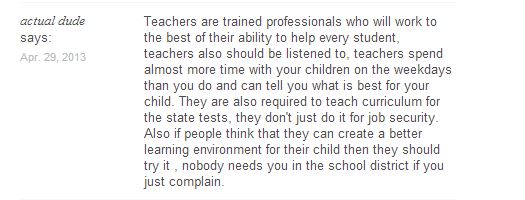Friday Freakout: Parents Should Be Seen, Not Heard
When our president and CEO, Robert Enlow, participated in a policy forum with Diane Ravitch last Friday in Indianapolis, the audience of more than 1,000 literally hissed at the topic of school choice. The experience was passionately one-sided—no doubt many public educators comprised the audience. Nevertheless, we learned a great deal from that night.
One recurring theme was the idea that, in Ravitch’s words, if parents want accountability for schools, they should look in the mirror. That is, a successful accountability system is one where parents hold themselves accountable for their children’s education. The audience roared and applauded in agreement.
There is no denying the unfortunate fact some parents do neglect not only their children’s education but their children as well. We believe school choice at least increases the opportunity to inspire those parents to act on behalf of their children. But solutions for truly derelict parents extend well beyond the education system.
However, there also are many, many parents—perceived as neglectful by the Ravitches of the world—who do want to get involved in their children’s education at their zoned public schools. And what happens to them is not always encouraging.
This freakout can give you a glimpse at what those parents encounter. It comes from the comments section of an evergreen post by SchoolFamily.com called “10 Things Teachers Don’t Want to Hear From Parents.”

If an involved parent has been told, “You don’t know what’s best. Leave it to us,” and their child continues to struggle in school, a school choice program can empower them to find a school that better meets their needs. If a teacher finds a parent to be a hindrance, the teacher should be relieved school choice helped that parent move on.
Now, we know for every teacher who views parent involvement in a negative way, there are far more teachers respectful and, frankly, happy to work with parents who make an effort to ensure their child is getting the best education possible. We celebrate them, and, in a perfect world, they would mentor every new up-and-coming teacher. Still, our overall message stands in this imperfect world: If parents have the power to choose from a variety of schooling options, they can better hold themselves accountable.
Plus, studies actually show that the more decisions parents are allowed to make about their children’s schooling, the better they become at shopping for information to make those choices—no matter their socioeconomic status.
We encourage you to share this post with your friends and talk about solutions that can work in tandem to improve education for more students. If you’re interested in learning more about our idea of a successful accountability model for schools, check out our official position here.




